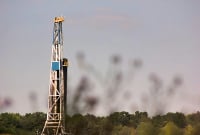Support strong Canadian climate journalism for 2025
Fresh water has always been key to making summer memories with friends and family, but it is also how most people will feel the impacts of climate change.
Summer 2023 — the hottest ever on record — brought extreme flooding, wildfires and droughts across Canada, often occurring simultaneously. This summer, a wildfire has devastated the Alberta town of Jasper. No part of Canada was spared from devastation and the staggering financial consequences felt across income loss, infrastructure damage, health costs and community upheaval:
- One week of wildfire smoke in Ontario resulted in an estimated $1.28 billion in health costs (CCI);
- Halifax faced an estimated $20 million price tag to recover from storms, wildfires and flooding;
- The Northwest Territories required over $187 million in recovery funds following wildfires, in addition to the British Columbia wildfire season costing over $1 Billion
- Additionally, the United States, which shares a 3830 kilometre freshwater border with Canada, elevated water scarcity to a national security issue in February due to its downstream impacts on economic, food, and energy security.
The Canadian Coalition for Healthy Waters (CCHW), representing more than 50 organizations, has demanded meaningful federal action on freshwater policy, investments, and collaboration. The coalition has been calling on the federal government to take action through three goals to get ahead of the climate crisis and the devastating weather events impacting watersheds, costing billions of dollars from coast to coast.
Strengthen the Canada Water Agency
The first-of-its-kind Canada Water Agency leads federal action, research, knowledge and development on freshwater. The agency is currently focused on eight basins — Great Lakes, Lake Winnipeg, Lake of the Woods, St. Lawrence River, Saint John River, Fraser River, Mackenzie River, and Lake Simcoe — and could position Canada as a global leader.
That would require that the government also advance reconciliation with Indigenous peoples through co-governance practices, utilize the United Nations Declaration on the Rights of Indigenous Peoples, and prioritize Indigenous knowledge and Water Guardianship programming in water policy. This approach could make the agency a global beacon for holistic water governance.
B.C. has been successful with an initial $100 million investment in the BC Watershed Security Fund. This initiative, co-developed between B.C. and the First Nations Water Table, is an example of collaboration and climate adaptation in the face of climate impacts from the 2023 drought and wildfire season. With support from the federal government to grow the fund to $1 billion, the fund could serve as a model for success across the country, notably promoting meaningful co-development opportunities through regional freshwater action.
Renew the Canada Water Act
Canadians can no longer be assured that our waters are abundant, safe, and secure. Our primary freshwater legislation, the Canada Water Act, is nearly 50 years old and does not mention climate change or the rights of Indigenous Peoples. The agency must make updating and co-drafting the legislation with Indigenous Peoples its first priority.

Properly Resource Freshwater across Canada
Canada has invested in fresh water through the Freshwater Action Plan, a federal commitment of $650 million over 10 years to protect and restore water quality and ecosystem health in the eight freshwater basins mentioned above. However, this falls short of the $1 billion promised in 2020, and with a bulk of this funding being allocated within the Great Lakes, other watersheds are left woefully underfunded.
Honouring the original funding promise is imperative, with funds directed to overlooked and underfunded watersheds across the country. These efforts can be supplemented through national and international commitments to climate change, including Canada’s sign-on to the WWF Freshwater Challenge and the 30 by 30 commitment through multiple nature agreements and investment programs.
The reality of the Canadian summer, and how we experience it, is changing. The waters we rely on for our favourite activities are under tremendous stress, and we are all feeling the impacts.
Science is telling us to act now, and economics promises a significant return on investment; every dollar invested in adaptation can save $13-$15 down the road, according to the Canadian Climate Institute.
By creating a robust Canada Water Agency, investing in fresh water and renewing the Canada Water Act, the federal government can demonstrate its commitment to addressing climate change and protecting Canadians.
After all, what is summer without water?







Comments
I have been grousing for years about the way Canada has so cavalierly wasted its abundance of fresh water, What the Middle east wouldn't give to have access to a fraction of what we have. Now, the S**t is ready to hit the fan. We can expect extreme unpredictability in our climate and this will undoubtedly endanger our fresh water. Meanwhile mining, gravel operations and other assaults like pumping water from glacial aquifers to sell for profit and distributing plastic waste water bottles throughout our land and waterways and oceans seems to be above the law and represents an existential threat to life on earth. When will our increasingly dumb and weak kneed politicians wake up and do something - like protecting fresh water from mining contamination, like re-establishing beaver colonies in our hinterlands to restore the chains of lakes and streams that once nourished our forests and helped preserve them from wildfires? Water is life. Just look at planets without water. Where there is no water, Summer is just purgatory.